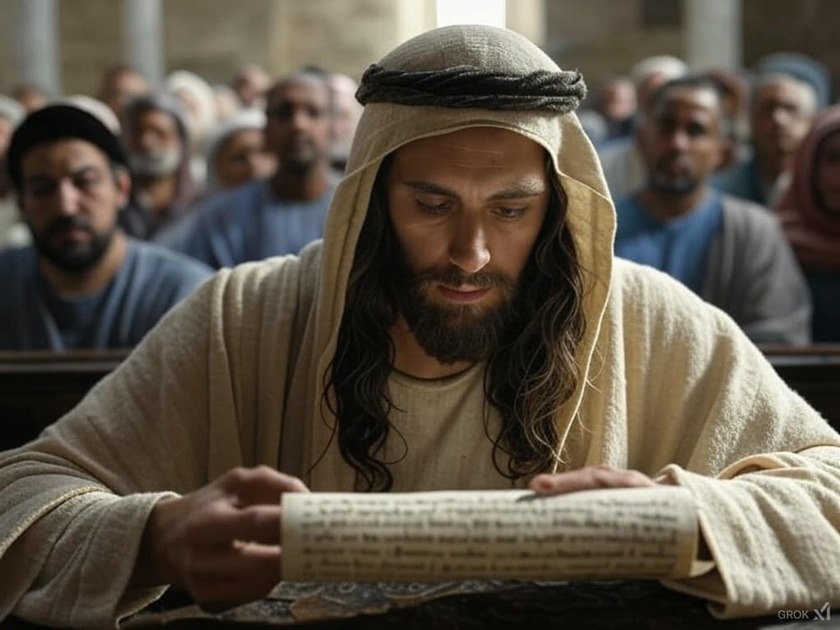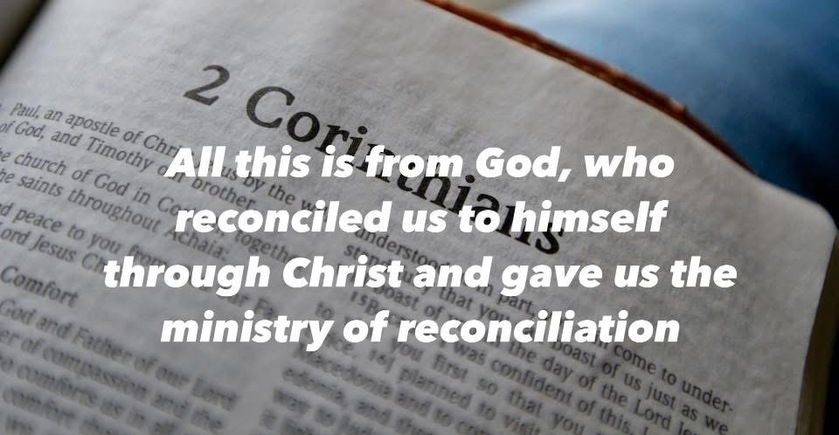Luke 4:16
"And he came to Nazareth, where he had been brought up. And as was his custom, he went to the synagogue on the Sabbath day, and he stood up to read."
The purpose for Jesus Christ coming into the world was to testify to the truth and redeem the world to God. This became necessary because of mankind's unrepentant rebellion. Because the world has been polluted by evil, and no one is good. So, God sent his only begotten son into the world as a man to testify to the word of God, to proclaim the day of the Lord's judgement, and to bring peace with God for those with whom he is pleased. He is said to be the light going out into the darkness. But does the darkness want anything to do with the light?
John 12:36
"While you have the Light, believe in the Light, so that you may become sons of Light."
All these things are said about Jesus throughout the gospels and the New Testament. And it is also said that darkness does not know him.
Jesus went into his temptations in the wilderness with power from the Holy Spirit, and he leaves there with that same power and his ministering angels. He returns to his home synagogue in Nazareth after having visited many other regional synagogues where he and his message of light was received very well, to the glory of God.
So he's in Nazareth where he was known by all as the carpenters son. And as was his custom, we're told, in the synagogue he was given the scroll of Isaiah and he read the word for today from it. So, he's teaching from the words of the prophet. Expositional preaching and then some.
He finds where it is written about himself...
Isaiah 61:1-2
"The Spirit of the Lord God is upon me, because the Lord has anointed me to bring good news to the poor (afflicted) ; he has sent me to bind up the brokenhearted, to proclaim liberty to the captives, and the opening of the prison to those who are bound (recovery of sight to the blind) ; to proclaim the year of the Lord's favor, and the day of vengeance of our God; to comfort all who mourn..."
And he reads this focus scripture to the congregation there.
Then he closes the scroll, hands to over to the servant of the synagogue, and he finds his seat. So now all are attended to him. Everyone's eyes are upon him. No doubt they've heard the stories about the happenings going on in all the other synagogues in the area throughout Capernaum. So with bated breath, they wait to hear a word from God. Likely in the minds of many of these people, they are thinking that Jesus might be a prophet of God. They certainly received him as a teacher, as a rabbi. And so, he sits and prepares himself to teach, as is the custom of the rabbi in this manner.
Jesus read from Isaiah sixty-one, the passage concerning the coming Messiah, certainly a prophecy that everyone knew and longed for especially in that age of Roman occupation.
Jesus speaks to them...
Luke 4:21
He began by saying to them, "Today this scripture is fulfilled in your hearing."
Now, it's important to note that though Jesus just said that this scripture is fulfilled in their hearing, he didn't read the entire prophecy to them. That prophecy about the coming Messiah and his ministry is a twofold prophecy. There's a beginning and then there's a second beginning. Jesus read to the end of the first coming that was predicted. The rest of Isaiah sixty one has to do with what will be done when the Messiah comes again. That prophecy about the second coming speaks of the judgment and all that will come from it in that second advent of the Messiah.
This first advent protestation from Isaiah sixty one is the gospel being proclaimed there and now, clear and present. Jesus is introducing the gospel light into the world as having been fulfilled in him, right then and there. And he's sensing that many there, if not most, are not receiving it. They're obviously amazed at his teaching and are touched by his words, but they cannot see beyond the carpenter's son.
For a brief, shining moment, the people marveled at Jesus’ words. They spoke well of him and were amazed at the gracious words that came from his lips. And then skepticism sets in.
"Isn’t this Joseph’s son?"
I imagine that this murmur began in the back somewhere, probably began with some demonic servant of Satan.
I imagine, because of what follows, that they said this with at least a hint of condescension. Likely the people were visceral about the ideas that Jesus was suggesting. As is said, familiarity breeds resentment. And Jesus confronts their doubts with a truth that strikes at the very core of their disbelief. He says to them,
"Truly I tell you, no prophet is accepted in his hometown."
And he goes on to explain how no prophet has been accepted by the people without dissension. The prophets come and they go, they bring miracles, and yet some don't receive their miracle, and therefore they don't receive a word from God because they didn't receive their miracle. Widows remained widows, poor and unhealthy remain afflicted, even as the profits are healing other widows of their afflictions. People afflicted with terrible illnesses remained in poor health, even as the prophets' healed others of their suffering. This brings to mind later on when Jesus explains to Judas, and the other disciples, that they will always have poor with them. But that they should receive the blessing of the presence of the Messiah while they have him and be thankful for that quite frankly.
Jesus understood that the people of his hometown wanted him to do the things that they had heard about. The things he was doing throughout Capernaum. They wanted to see this miracle man; they wanted to see their blessing. And for whatever reason, Jesus didn't do those things in Nazareth. Maybe just to make this point. That some people only want the miracle, and maybe a message, but are not truly interested the messenger.
How often do we see this among the various sects and Christian communities. How often do we see people chasing after the experiences, and the life affirming messages, but not seeing the forest for the trees. Chasing after works and deeds and not seeing the root for the long and sprawling vine that branches out from it. Not understanding who it is that is standing right there before them.
Luke 4:28-29
"All the people in the synagogue were furious when they heard this. They got up, drove him out of the town..."
I wonder sometimes about people of faith. If you never received your experience, whatever that experience is, would you still love God? Can you reflect upon your faith, and your so-called walk of faith, and see how it might stand alone without having experienced some conversion moment or inspiration? I'm not asking this to suggest that it should. I truly wonder and I truly wonder even about myself. But I do think we should at least think about it. And then rest assured because we don't have to be concerned about it. We know it's certain that Jesus Christ is our Lord in God, we proclaim it with certainty. And we hold onto that Hope that we have in him. We see this moment in Jesus' hometown for what it is, as the mob of friends and family chase him out of town. And we must recoil from it. We can understand them, they aren't us, or at least we hope they aren't us.
I hope that many in his hometown eventually came around to him. But maybe not, maybe they lived up to the saying about Nazareth, that nothing good can come from it. Nothing but one good thing, the son of Nazareth, the son of God, Jesus.
Let's just be thankful and happy that these people in Jesus' hometown did not prevent him from going on. What follows next just keeps on getting better. But, from this moment on, all the momentum is hindered by others like the people in his hometown. At no point during his ministry is Jesus free of these detractors. So, as they say, it is what it is.




















